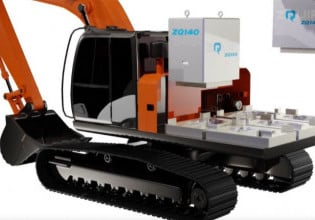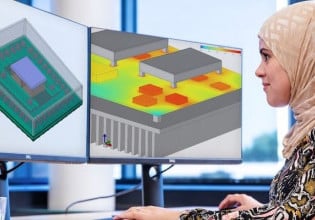Phase-Change Memory Now Sampling for Automotive Microcontrollers
STMicroelectronics has presented at IEDM2018 architecture and performance benchmarks of a technology based on 28nm FD-SOI with embedded Phase-Change Memory (ePCM) designed for its automotive microcontrollers (MCUs). ST's products based on ePCM are sampling now to alpha customers, with field trials meeting the requirements of automotive applications and full technology qualification expected in 2020.
These MCUs—the world's first to use ePCM—will target powertrain systems, advanced and secure gateways, safety/ADAS applications, and vehicle electrification. Pictured above is a cross section of the embedded-PCM bitcell integrated in the 28nm FD-SOI technology shows the heater that quickly flips storage cells between crystalline and amorphous states.
With more demanding automotive applications, constraints on processing power, power consumption mitigation, and larger memory requirements are pushing for new automotive MCU architectures. One of the most challenging demands is for larger embedded memories as firmware complexity and size increase dramatically.
ePCM presents a solution to these chip- and system-level challenges, meeting automotive requirements for AEC-Q100 Grade 0, operating at temperature up to +165°C. In addition, ST's technology assures firmware/data retention through high-temperature soldering reflow processes and immunity to radiation, for additional data safety.
ST presented an update on the architecture and performance of a 16Mb ePCM array for a 28nm FD-SOI automotive MCU at the 2018 International Electron Devices Meeting (IEDM) in San Francisco on December 4.
"Having applied ST's process, design, technology, and application expertise to ePCM, we've developed an innovative recipe that makes ST the very first to combine this non-volatile memory with 28nm FD-SOI for high-performance, low-power automotive microcontrollers," said Marco Monti, President Automotive and Discrete Group, STMicroelectronics.
"With samples already in some lead-customers' hands, we're confirming the outstanding temperature performance of ePCM and its ability to meet all automotive standards, further assuring our confidence in its market adoption and success," Monti added.
Phase-Change Memory (PCM), which is made using a Germanium Antimony Tellurium (GST) alloy, takes advantage of rapid heat-controlled changes in the material's physical property between amorphous and crystalline states. These states, which correspond to logic 0 and 1, are electrically differentiated by high resistance in the amorphous state (logic 0) and low resistance in the crystalline state (logic 1).
Moreover, unlike Flash-based memories that require at least a byte- or sector-erase cycle before reprogramming, PCM technology offers single-bit alterability, which simplifies software handling of data storage and ST's implementation benefits from patented technology related to the memory cell and to the GST alloy to support high temperature data retention.
Embedded Memory technologies are at a crossroads. The integration of conventional floating gate embedded Non-Volatile Memories (eNVM) represents a significant technical challenge at 28nm and smaller silicon geometries in both FD-SOI and FinFET advanced CMOS technologies. New NVM technologies, based on the functional properties of particular exotic materials, employ radically different physical mechanisms than those used with Flash memory technologies and provide a more effective solution to the process integration difficulties raised by the disruptive 28nm CMOS transition. Among these new NVM technologies, often called "emerging memories," the most mature is Phase-Change Memory (PCM).
ePCM advantages:
- Write Performance / Data Retention
- With single-bit alterability, PCM technology delivers significantly better write and comparable read performance than Flash-based memories that require at least a byte- or sector-erase cycle before reprogramming. This single-bit alterability simplifies software handling of data storage. ST's implementation benefits from patented technology related to the memory cell and to the GST alloy to support high-temperature data retention, including during solder reflow, so firmware can be uploaded to ePCMs before mounting and soldering.
- High Density / Low Power Roadmap
- The speed/power characteristics of the ePCM macro-cell and its roadmap at smaller geometries offer a scalable solution for large embedded memories.
- Robust Performance
- ST's PCM technology has been developed and tested to operate within the most stringent automotive requirements for robust high-temperature operation, radiation hardening, and data retention. ePCM achieves automotive requirements for AEC-Q100 Grade 0 with an operating temperature up to +165°C.
- Flexible Back-end Process
- ePCM is a back-end technology which separates the non-volatile memory-cell process module from the complex logic-transistor modules built in the Front-End. As a Back-End, metallization-based process, ePCM is technology-independent, so it can be embedded in virtually any technology node.
- FD-SOI and PCM Combined
- Fully Depleted Silicon On Insulator, or FD-SOI, another technology that ST pioneered, is a planar process technology that delivers the benefits of reduced silicon geometries while actually simplifying manufacturing. Combining 28nm FD-SOI and PCM enables memory array sizes that are 4-5 times larger than what Flash on bulk 40nm CMOS can achieve.






